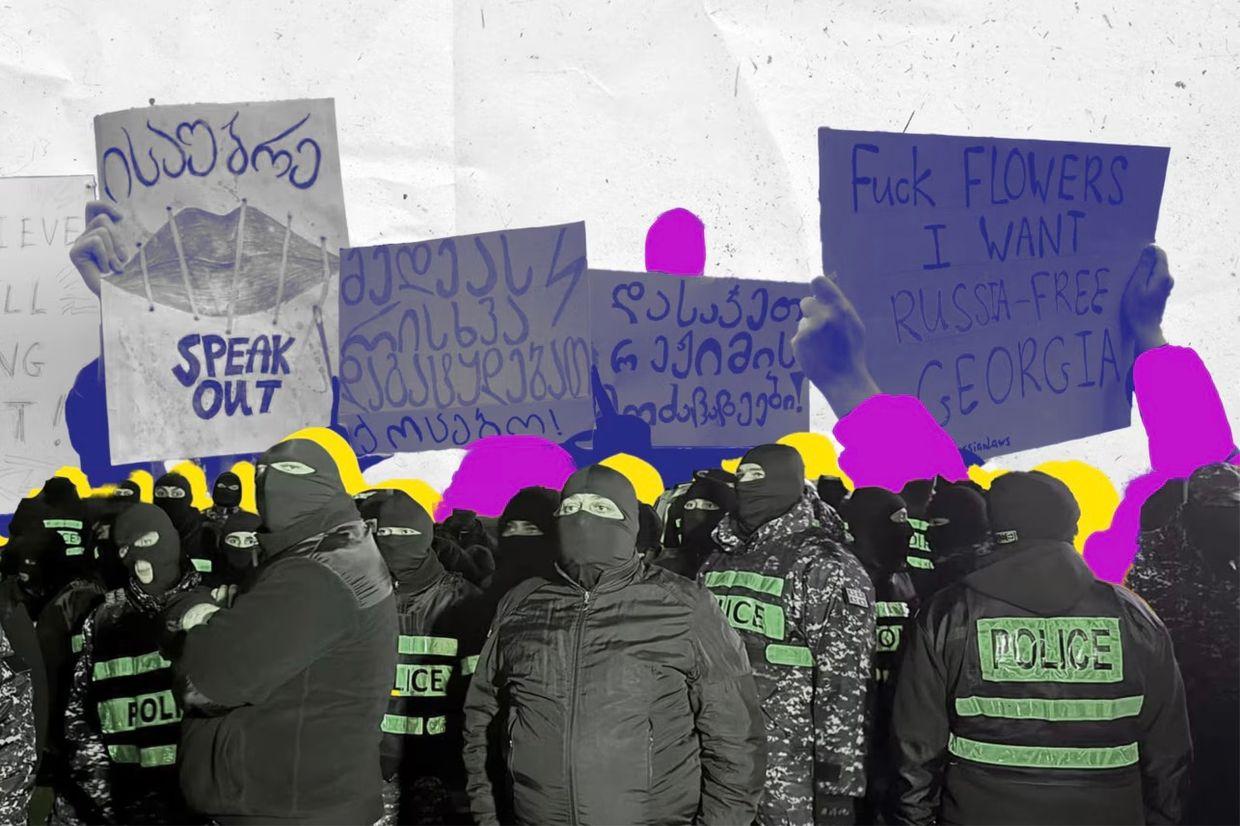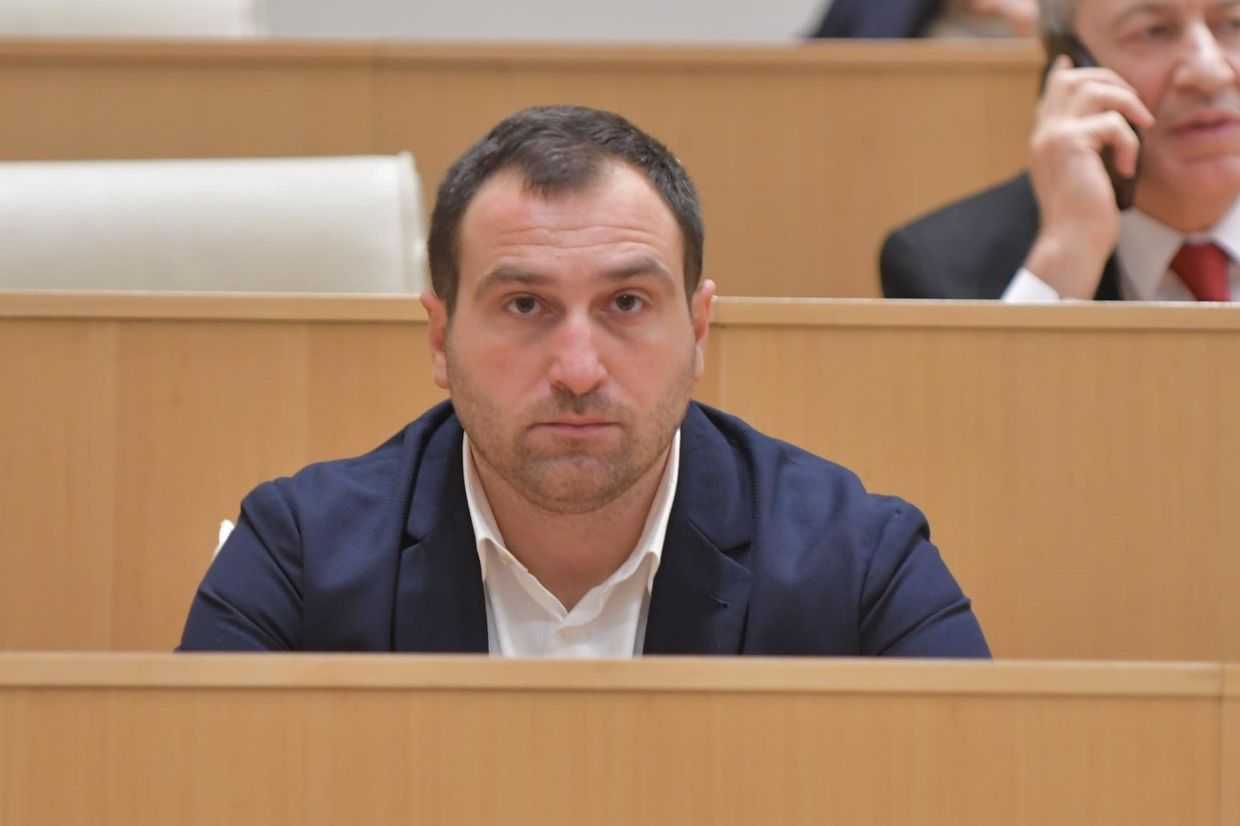‘We come to the rally, we’re having a snack and one of them asks us, “How many can you put in your mouth at once?” They make these obscene jokes with their faces covered’, 20-year-old Keta Kurasbediani told RFE/RL during the 2 February rally by Tbilisi Mall as masked police were on her and other protesters’ heels.
Recalling the story in an interview two days later, she said that day was the first time she experienced sexual harassment.
‘I had heard rude calls like “move from the damn street” many times, but on 2 February, their behaviour was outright outrageous. In addition to what they said to me, I heard the same police officer tell another girl, “I’ll blow that whistle into your arse”, Kurasbediani said, adding that the men were masked, dressed military-style, and scattered around the protesters in groups of three.
‘We wanted to get out. They were moving so tight through the crowd that I thought they’d set up some sort of a provocation and detain us. I even zipped my pockets so they wouldn’t plant anything in them’, Kurasbediani told RFE/RL.

That day, many women became targets of verbal sexual harassment from police. The police also arrested over 30 people, five of whom were beaten by masked men so badly — first in the street and then in police cars — that they needed to be hospitalised.
Several journalists witnessed masked police calling women ‘₾100 ($35) whores’.
‘I am raising three children for this country. Who are you to talk to me like that, wearing a uniform? How are you not ashamed?’, 38-year-old Anano, a mother of two, recalled saying in response to the insults.
‘I’ve heard of such stories, but this was the first time I personally experienced them, and I’ve been to many rallies’, Anano told RFE/RL.
‘I didn’t say anything insulting towards them. I didn’t even call them slaves [a common insult towards Georgian Dream officials and their supporters]. We stood on the pavement where the road narrows, past the mall. Three or four rows of police stood alongside, dressed all black, without any insignia. Their cynical and dismissive attitude stood out. “Go home and do the washing-up rather than stand here”, I heard. Someone shouted from the third row, “Look how many whores are here”, “Tinder whores” ’, Anano recalled.
‘I asked the masked men, “Do you think it’s normal for law enforcement to talk to women like that? You’re scoundrels, hiding behind masks in the third row. How are you not ashamed to listen to what your colleague is calling us?” In response, I was just told to move.’
‘A bit up the street another one shouted at us, “You drunks, how are you behaving?” I told him to bring a breathalyser to see who was drunk here’, Anano said.
A few minutes later, Zviad Kharazishvili, head of the Special Tasks Department, arrived and cursed at the protesters through a megaphone.
Shortly after, masked men brought a young protester to Kharazishvili, who then kicked the protester in the leg. Police and Georgian Dream officials later said that the footage — caught by several cameras — didn’t show any crime. The detained man kicked by Kharazishvili was fined ₾2,000 ($720) by the court two days later.
The US has included Kharazishvili in its Global Magnitsky Sanctions Programme for his role in serious human rights violations. In January, he was awarded the Order of Honour by disputed President Mikheil Kavelashvili. Kharazishvili, who is considered one of the main organisers of torture and violence against protesters was also sanctioned by the UK.
Vulgarities, threats, and beatings
‘Wanna suck dick? They pay you ₾100 ($35) to be here — come and I’ll fuck you for ₾101. I’ll use you in every hole,’ Salome Kamladze, another protester, said, describing on Facebook that it was only an excerpt of what she heard from the police at the Tbilisi Mall rally.
‘Then they beat us and cursed at us. I couldn’t stand it and said only three words: “Aren’t you ashamed?” One of them punched me in the face. My lip bled and that animal told me, “Your cunt will bleed too after I fuck you”, Kamladze wrote.
‘They cursed at a woman and tried to provoke the man next to her, “What kind of a man are you? Can’t you protect your woman?” They will probably sit later and talk about how “our” side has such cowards’, historian Irakli Veshaguridze told Formula. He was detained at the same 2 February rally.

At least four cases of sexual violence against women by police have been filed since the spring of 2024. Investigators found proof of crime in none of these cases.
Georgia had done much to reduce violence against women as a part of its efforts to join the EU and mainstream human rights practices in its police and justice systems. Between 2020–2023, the Council of Europe alone spent more than €1 million ($1 million) to better train the police to protect victims of sexual violence.
‘You thought you’d come here and be spared? We will put you in the police car, put you on your knees, and make you suck. Maybe we’ll even fuck you in the mouth, you whore’, a 26-year-old woman said, recounting what masked police had told her. The woman told her story under the condition of anonymity.
Georgia’s EU U-turn and mass protest movement
The 26-year-old woman was threatened on 28 November, the day a large number of people spontaneously took to the streets of Tbilisi after Prime Minister Irakli Kobakhidze said that Georgia was suspending its EU accession process until 2028. Many viewed the announcement as a violation of Georgia’s constitution and a turning point towards a pro-Russian policy for the country.
That night, police detained 43 peaceful protesters. Some of them were beaten so badly that they had to be hospitalised with facial fractures, concussions, and eye injuries. The authorities used water cannons, pepper spray, truncheons, rubber bullets, and tear gas against the demonstrators.
The young woman was detained by masked police at dawn while she and her friend were trying to help a man lying on the street. Police were swearing and kicking the man in the face.
According to her, masked police dragged her away from the main street, beat her, cursed at her, and threatened to rape her in the police car. The threat felt so aggressive, dangerous, and immediate that the woman first wet herself and then fainted. The police got scared and left her in the street.
‘I don’t remember any faces. They were three huge men with only their eyes visible. When I woke up, I was lying in the street, all wet. I couldn’t stop crying. People were still being beaten and detained in the street below and I could hear the sounds of this hell’, the young woman said. After the incident, she wasn’t able to leave her house for a week.
She refused to cooperate with the police, whom she didn’t trust, but she told her story in detail to organisations that document police violence. According to them, such a case of sexual violence wasn’t an exception, as the police threatened to rape several protesters — both women and men.
‘I will shove this truncheon up your arse. In Europe you like to fuck in the arse’ — this phrase is mentioned in different iterations by many demonstrators who experienced detention, beatings, and abuse.
‘My friend was detained on Rustaveli Avenue for nothing. When I saw how they dragged her away, I stood in front of the police cordon. First they dragged me into the cordon, then into some dark minibus. I was scared and asked them to release me’, another young woman, Beatris Gazdeliani, recalled at a court hearing.
Gazdeliani is a well-known reality show contestant. The footage of her standing alone in front of the police cordon on Rustaveli Avenue on the night of 7 December went viral online. The young, thin woman with long hair and open arms — a sign of peaceful protest — stood for several minutes in front of the masked, truncheon and shield-wielding special police force.
Minibuses are mentioned in many accounts of beaten and tortured protesters. They described that it was in these vehicles that the masked men’s brutality really showed.

‘When they took me to the police station, something very unpleasant happened. Masked police were filming me. They told me, “We know about you, we know that you’re a stripper, that you dance naked”. I didn’t know why they were telling me this and what to do. It was horrible. They probably wanted to throw me off-balance, and to blackmail me’, Gazdeliani recalled. The police charged her with disobedience and resistance, and the court found her guilty, even though the footage clearly shows that she was detained while protesting peacefully.
An ongoing pattern of abuse
Police abused and sexually harassed women even before the on-going pro-EU protest.
Natia Dzidziguri was detained on 19 November, the day several hundred people protested overnight against the results of the 26 October parliamentary elections they believed were rigged.
Dzidziguri recalled that the police who detained her singled her out from the crowd and told her that she had a big mouth and needed to be punished. Later, when she and several others were put in a car, Natia was thrown at the feet of other male detainees.
When she asked to be seated while taken to the police station, the police in the back seat pointed to his penis. During the half-an-hour drive to the station, he repeated this gesture several times.
‘He was pointing between his legs, saying, “Come, sit here”. At first I was very scared to talk about it. Later I found out the man’s identity and reported him. I didn’t dare speak out about it until the other detainees who were with me in the car agreed that violence took place and to be my witnesses’, Dzidziguri said.
Soon after, Dzidziguri’s brother became a police target. He was detained and beaten during the 1 December rally. So far, the investigation has had no results in either case.
In Georgia, the Special Investigation Service is tasked in independently investigating crimes committed by police. It was created as a part of Georgia’s EU reforms, but so far there has been no high-profile case where this agency brought a police officer to justice. Despite the hundreds of reports of police violence in 2024 alone, there has been no progress, and the agency’s procedures usually conclude after interviewing victims.
On 6 February, the Special Investigation Service told RFE/RL that investigations into obstruction of journalistic activities and alleged violence against protesters in November and December 2024 were ongoing and that 404 people were interviewed, including 50 journalists. They said that 230 people injured at the protests were medically examined, 2,000 hours of video footage were being studied, clothes of 63 people were seized as evidence for forensic examination, and 81 people were granted victim status.
It’s still unclear how many cases are being investigated or how many police have been questioned, including high-ranking officials. The agency did not answer RFE/RL’s question whether Zviad Kharazishvili was among those questioned.
This article was first published by the Georgian service of RFE/RL on 7 February 2025. It was translated from Georgian by Dominik K Cagara and edited for conciseness and clarity.









